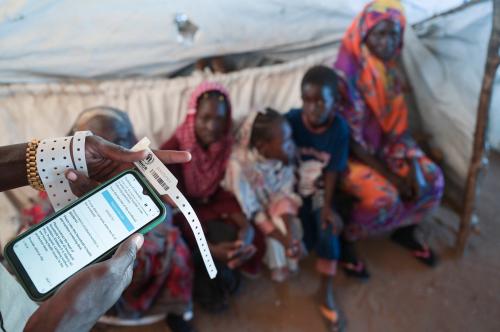As we enter August under more-flexible-than-usual schedules and more time at home, many of us may have increased opportunities for long-form reading. Below, some of the scholars and advisory board members of the Brookings Africa Growth Initiative offer their recommendations for books to read during this time, especially since the commentary on Africa in Focus will be slowing down over the next month.
 Louise Fox recommends
Louise Fox recommends
The Informal Economy Revisited: Examining the Past, Envisioning the Future
The dynamism of the nonfarm informal economy in Africa, and its contribution to economic growth and poverty reduction, are often misunderstood and underestimated in economic literature. The sector is often stigmatized as “low productivity, subsistence employment,” and policy initiatives are generally designed to get rid of it, not enhance its productivity, earnings, and stability. Yet this sector is centuries old and emerging in new forms in 21st century Africa as well as in other parts of the developing world. This book, edited by pioneers in research and development practice on the informal economy, pulls together scholarship from all over the world to document how the informal economy has changed, what are the realities of informal work and the connections between the formal and informal sectors in today’s global economy, and what are effective programs and policy that increase the economic opportunities and welfare of those working in the sector as well as enhance their rights and dignity. Per the book: “This raises the question of why informality at the base of the economic pyramid– the working poor trying to operate in the gaps in public space and public rules—tends to be penalized, while informality at the tip of the pyramid—the rich and powerful colluding with the state to bend formal rules – tends to be rewarded.”
 Lemma Senbet recommends
Lemma Senbet recommends
Economics in the Age of COVID-19
I think this book can help us understand the pandemic and coping with it—it’s not an Africa-specific message, but rather a universal one. This is one of the first, if not the first, such books on the subject. Gans provides a systematic look at the phases of the pandemic economy and at how economic choices are being made in response to COVID-19, from containment to reset to recovery—and dispelling the false trade-off between public health and economic health—and highlighting the long-term consequences of the pandemic. This is a heroic effort on short notice and should be interesting reading for the summer.
 Landry Signé recommends
Landry Signé recommends
Turning Point: Policymaking in the Era of Artificial Intelligence
The transformative power of artificial intelligence has rooted itself at the core of the Fourth Industrial Revolution, fueling some of the most disruptive innovations at an unprecedented pace and stretching into all levels of business, society, and government. Our own Darrell West and John Allen have written an exceptional analysis of the current state of artificial intelligence (AI) and the unstoppable potential it holds, presenting a brilliant array of recommendations critical for the inevitable regulatory framework we will need to construct.This is a crucial tool for policymakers to use in understanding how to confront AI, and a must-read for anyone wanting to take a deep dive into the great responsibility we face in using it for good.
 Amadou Sy recommends
Amadou Sy recommends
Tyrant: Shakespeare on Politics
A question for the ages is why good policies are not implemented by people in power. I do believe that some lessons about governance transcend place and time, and history can teach us a lot on these matters. As economists often do, why not start with a stylized model? A tyrant in this case, as the author does here. A nice premium is that this book covers several of Shakespeare’s plays, giving one without an in-depth knowledge of the playwright’s work more insight into his important texts. Finally, the book is designed to be read one chapter at a time, which makes it really practical to read (it’s definitely not Tolstoy’s War and Peace).
Titles by Brookings Africa Growth Initiative scholars
Africa Growth Initiative’s own scholars have published several important books and commentary on some of the most pressing challenges and promising opportunities facing the region today.
 John Mukum Mbaku
John Mukum Mbaku
Governing the Nile River Basin: The Search for a New Legal Regime
The fight over access to the waters and resources of the Nile River Basin has recently become quite heated as Ethiopia completes its Grand Ethiopian Renaissance Dam (GERD) and begins the process of filling it. In fact, Egypt, Ethiopia, and Sudan have been involved in several meetings recently, including one in Washington, D.C., to resolve the conflict over the Nile. This book explores the history of this complex, long-standing topic and discusses strategies for equitable sharing of the river’s resources for mutually beneficial opportunities for the livelihoods of people in the riparian States.
 Landry Signé
Landry Signé
Unlocking Africa’s Business Potential
Africa continues to have tremendous economic potential and offers rewarding opportunities for global and local businesses looking for new markets and long-term investments with favorable returns and high socioeconomic impacts, including economic recovery and resilience post-COVID-19. Increased political stability in recent years and improving regional integration are making market access easier, and business expansion will generate jobs for women and youth, who now make up the vast majority of the population. But how can investors, entrepreneurs, and Africa-watchers capitalize on these opportunities and, in doing so, support African economic growth? In this book, Landry Signé examines major transformations, economic trends, and business opportunities in the eight sectors with the highest potential returns on private investment—the same sectors that will foster economic growth and diversification, job creation, and improved general welfare. The book’s analysis of these sectors is based on case studies that identify specific opportunities for investment and growth, along with long-term market projections to inform decisionmaking and strategies to capitalize on investments.
 Amadou Sy
Amadou Sy
Africa through an Economic Lens
Using economic policy analysis, this book examines the vision for achieving a more peaceful and prosperous Africa through the cooperative actions of the African Union, Africa’s private sector, civil society, women, and youth. It looks at the continent’s progress in delivering on this vision, specifically its ability and progress in maintaining momentum, sharing the benefits of growth, and financing its development. The book also looks at risks and opportunities that are part of this vision—such as population growth, urbanization, and technological changes, and the role that countries such as the United States and China, as well as institutional and private-sector partners, can play in achieving Africa’s vision.
The Brookings Institution is committed to quality, independence, and impact.
We are supported by a diverse array of funders. In line with our values and policies, each Brookings publication represents the sole views of its author(s).








Commentary
A social distancing reading list from the Brookings Africa Growth Initiative
August 4, 2020